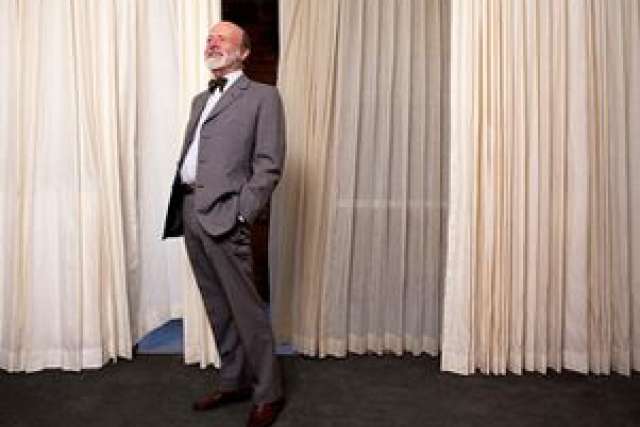Dr. Peter Whybrow, best-selling author and director of the Semel Institute for Neuroscience and Human Behavior at UCLA, is not surprised by the high incidence of obesity, diabetes, depression and other maladies in the U.S. today. The renowned UCLA psychiatrist and endocrinologist believes that a stressful mismatch between the brain’s evolved biology and today’s seductive, demand-driven culture has helped shape behavior and habits that are disruptive to a life well lived. Whybrow’s popular books, including his latest, “The Well-Tuned Brain,” explore this cultural mismatch and how we can restore life's balance through neuroscience and self-understanding. He spoke with UCLA Magazine writer and editor Mary Daily.
How did you come to study both endocrinology and psychiatry?
After I finished medical school, I worked at University College Hospital in London, caring for patients with thyroid cancer. In the course of treatment, individuals were deprived of thyroid hormone, and many became severely depressed and unable to think creatively. This intrigued me, so later I studied psychiatry specifically to explore the relationship among thyroid hormones, brain function and behavior.
As an endocrinologist, what do you observe about our stress levels today?
The stress system of the body is an ancient survival mechanism designed for acute life-threatening emergencies. The brain releases a flood of hormones that turn off when danger passes. But chronic stress is different. We are poorly tuned for the technology-driven relentless demand of modern-day living with attention-grabbing alarms ringing 24/7. Chronic stress has a big impact on our physiology. The more stressful and competitive society becomes, the more vulnerable we are to anxiety and depression. Here at UCLA, for example, about 20 percent of the students on campus consult student health services with such complaints.
What prompted you to start writing popular books?
I’m a firm believer in helping patients better manage their illness through self-understanding. That’s how it started, writing about the patient experience. Later, I became fascinated with how cultural and behavioral insight might help prevent many of our affluence-driven plagues, including some mental disabilities, which, in disrupting brain function, also invade the self.
What do you mean by “invade the self”?
If you have a disease of the body, you can be somewhat objective about it, but when an illness perturbs the brain and self-understanding, it distorts the way you see the world. The material, market-driven culture we have built reinforces that distortion in some instances.
How does the culture do that?
America is a nation of migrants. We are an optimistic, driven culture focused on individual achievement. Such behavior, rooted in the ancient brain, is also the engine of the market: short-term reward, social ambition and a fascination with novelty. This migrant zeal brings great material advantage, but also burdens — stress, myopia to future challenge, and mounting debt. This mismatch of ancient striving, a habit-driven brain and material affluence can wash away much of our better selves.
So you’re not surprised by the rate of diseases like anxiety, diabetes and obesity in the U.S.?
Not at all. These are diseases of affluence. It’s a serious challenge. Obese children will be obese adults, and their lifespan will be shorter than their parents’, not to mention the cost to public health. Affluence and poverty are both disruptive. And it is not just materialism: Affluence of information, opportunity and choice can each drive us off balance.
How does the wish for instant gratification harm us?
An affluent culture feeds instant reward. Consider debt or technology. Each enables us to enjoy the present without thinking about the long-term consequence. Credit card purchases blunt our awareness of true cost. Technological assistance now essentially permits 50 percent of Americans to avoid exercise.
How is this played out in the use of credit?
Easy credit changes the way we think about risk. Credit makes possible today what otherwise must be postponed. We think little about how the credit will be repaid because in our immediate focus, we discount the future. Thus are we seduced into carrying a growing debt burden that eventually becomes unsustainable.
The ancient instinctual brain lives in the emotional present and wants things right now. The lateral human frontal cortex, more recently evolved, better assesses long-term risk. Ideally, the two balance each other.
Where does the balance break down?
In the face of temptation. We’re good at assessing risk if the danger is apparent and immediate. “Should I cross Wilshire Boulevard when there’s a gap in the traffic but the traffic light is against me?” No: Reason prevails. But when the choice is less acute, and the reward desirable – “Should I stick to my diet or eat the chocolate dessert?” – the emotional brain wins over reason every time.
What are the down sides to personal technology?
Used wisely, the personal technologies can be of fantastic benefit. They are also compelling. The danger for the unwary lies in dependence, even addiction, until craving the next fix becomes akin to electronic cocaine. More broadly, I worry that despite being celebrated as a social revolution, our apps and eye-popping gadgets can impoverish the development of empathic understanding. While rooted in biology, the nurturing of such vital intuitive skills is the cultural foundation of character and social trust — the acquired manners and mores that knit society together and promote genuine human progress. I believe such qualities of mind will continue to be built upon intimate personal experience rather than its distillation through personal technology.
How do you manage stress in your life?
I try to practice what I preach. I walk to work. When I am in the office or a meeting, my phone is off. I [only] carry it when traveling and when on call. To leave one’s phone on invites others to prioritize one’s life. When it rings you are compelled to answer, thus hanging up on who you are with. Turning it off when not required reduces the stress of distraction and helps focus attention. I find that an essential adaptation to modern life.
Dr. Whybrow reads two excerpts from his latest book, "The Well-Tuned Brain": "Who do we think we are?" and "Love and weaving the web of trust."
This story appears in the January 2016 issue of UCLA Magazine.



